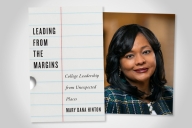You have /5 articles left.
Sign up for a free account or log in.
College and university leaders talk all the time about their embrace of global agendas: they strive to enroll international students. They sign agreements with institutions around the world. They boast about the global perspectives of their campuses.
But is American higher education truly global? Or could it be increasingly parochial?
A new book argues more for the latter view than the former. Reward structures, particularly for faculty members in social science fields that should be global in perspective, are pushing them inward instead, according to Seeing the World: How U.S. Universities Make Knowledge in a Global Era (Princeton University Press). The authors are Mitchell L. Stevens, associate professor of education at Stanford University; Cynthia Miller-Idriss, associate professor of education and sociology at American University; and Seteney Shami, a program director at the Social Science Research Council and founding director of the Arab Council for the Social Sciences. Their book is based on interviews with scholars in a range of social science disciplines.
Stevens and Miller-Idriss responded via email to questions about their book.
Q: College and university presidents talk all the time about their institutions’ "global vision" or internationalization. Yet your book suggests areas in higher education that have a decidedly American focus. Why is that?
A: There’s no question that U.S. universities are courting clients and patrons all over the world. But we found that these global ambitions are often not matched by faculty in the social sciences, who are often ambivalent about international research. Social-science journals, book publishers and faculty hiring committees in the U.S. strongly favor scholarship on North American and Western European topics. It’s a peculiar but powerful legacy of the 20th century, when these regions were unquestionably dominant on the world stage.
Q: As you look at disciplines, are some better than others at embracing an international perspective?
A: Not better or worse, but different. Economists often were adamant that their economic explanatory models had primacy over cultural context: the world provides cases for economists to test the models. As one of them put it, “To understand what their census statistics mean, I don’t need to speak their language. This is just wrong.”
Political scientists have a strong comparative tradition, which enables them to recognize and appreciate place-specific inquiry. But we heard repeatedly that regional expertise was second to methodological expertise as political science gets “teched up,” as one of them put it, in quantitative methods.
Sociologists were the most parochial of the three disciplines. Sociology department chairs said frankly that they deliberately steer graduate students away from international study because such projects on non-U.S. topics are less likely to have purchase on the tenure-line job market.
Q: Why does the tenure process seem to encourage American researchers to focus on their own country?
A: The tenure process is largely mediated by disciplines. Scholars have to attain recognizable disciplinary success through publications and presentations in disciplinary journals, university presses and conferences. External reviewers are primarily or even exclusively drawn from the same discipline. And because those disciplines prioritize their own theoretical abstractions, contextual knowledge loses out. This isn’t only a problem of U.S./national versus global knowledge, but rather of the value placed on knowledge dedicated to particular problems or contexts.
Q: Will the American focus hurt American higher education?
A: In the long term, yes, because the relentless race to build prestigious universities worldwide will mean ever more opportunities for scholars who can produce knowledge of consequence for patrons outside the U.S. We believe that American social scientists jeopardize their long-term relevance if they remain ethnocentric. But in the short term, the rest of the world continues to believe that Americans produce the best scholarship.
The challenge for social scientists is to leverage their current strong reputations while also adapting to secular changes in where the money is coming from. Though we didn’t investigate it systematically in this book, it appears that the professional schools -- especially schools of business and public policy -- have been most canny in responding to the globalization of academic patronage.
Q: Many global trends -- "America first" in the United States, Brexit in Britain, nationalism elsewhere -- seem to suggest a shift inward around the world. Does this influence American researchers? Does it concern you?
A: The big, but little recognized, factor here is the end of the Cold War. Between 1945 and 1989, leaders in the U.S. federal government and the national academy largely shared a conviction that communism posed an existential threat to the countries in what was once called the West. The global ascendance of capitalism and the steady rise of China, India and Brazil as economic powerhouses has upended the old good vs. evil narratives that, for better or worse, organized a great deal of academic patronage in the second half of the 20th century. There is no clear storyline or center of gravity now. We all want to be global, but no one is quite sure what that entails.








